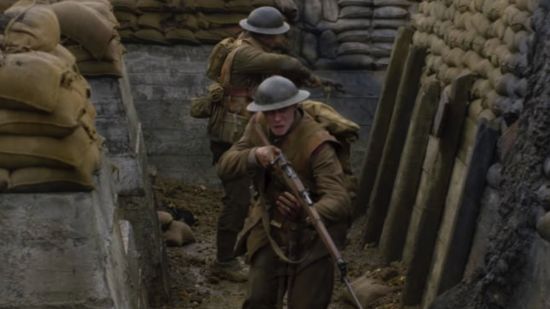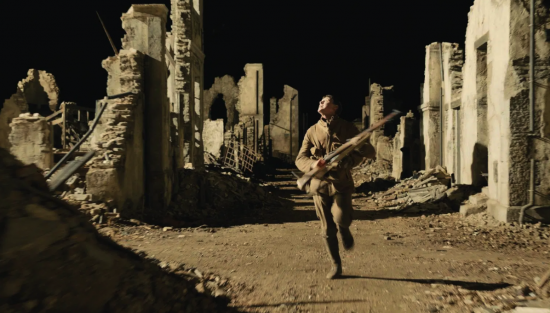Breaking Down The 1917 Debate
The film industry loves a good argument. Recent release 1917, Sam Mendes’s (potential Oscar-winning) movie has ignited discourse that has been raging since the awarding body was founded – does the movie that wins the Best Picture Oscar have to be good? Or relevant? The sheer number of opinions on what ‘best‘ mean will keep film criticism in business for centuries, but Hollywood loves an aggregator, so many will tune in on 10th February to see how 8,000 people vote on this year’s ‘best’ picture.
1917 has a good shot. Partly because of its subject matter – an absolute staple of the military-industrial awards complex. War – like animation – is not technically a genre, however the term ‘war movie‘ suggests a certain kind of serious, worthy and more often than not, male experience that garners attention and box office receipts. The war movie has not yet had its day, but commentary on 1917 is proving divisive. For every film lover calling it a masterpiece, there are others saying it’s not good at all, or that it’s pointless – how did opinions on an Oscar favourite become so polarised?
Here is a breakdown of the main arguments:
1917 vs Other war movies
The easiest criticism to make about 1917 is that it is unnecessary. There have been many films made about the Great War (what a misnomer), including Kubrick’s Paths of Glory, Thou Shall not Grow Old, Lawrence of Arabia and Gallipoli. It is more difficult to find a well-known WW1 movie made this century, with War Horse and Testament of Youth maybe being the most well-marketed. Compare this to the list of WW2 movies made, and the ratio is a startling 10:1 – movies about WW2 were literally being made while it was still raging – which is wild.
The “I watched Dunkirk, so don’t need to see 1917” joke meme is controversial because it suggests either a misunderstanding of different wars or the idea that all wars (and war films) are the same. That being said, is a largely European-centric, white-skinned war film the most appropriate use of resources when the world is struggling with other conflicts? This is where the awarding bodies should take some flak. Directors want to make war movies partly to recreate such a horrifying, visceral experience that lends itself to cinema, and partly because a war film has become the hallmark of a great directorial career. Those awards will just come rolling in, right? It’s a classic Hollywood self-fulfilling prophecy:
Studios finance war films -> that directors want to make -> that win awards and make money -> that leads to further financing -> and so the cycle continues.
War, what is it good for? The movie business, apparently.
These lucrative war films take up valuable real estate that could be populated with stories that don’t already have a thousand predecessors. 1917 cost $100million to make. With that budget you could finance Hustlers ($21m), Harriet ($17m), Honey Boy ($3.5m), The Farewell ($3m), Monos ($2m) and Waves (-$2m) and still have millions left for those glad-handing Hollywood brunches! These films about people of colour and their personal wars are crowded out of contention due to the undeniably old, white, male lens of 1917.
Is WW1 even the right war to focus on? Monos is about an unknown conflict, which feels much more prescient and relatable, but it has not been widely released. And anyway, audiences are becoming bored of these teeny tiny human wars – the most popular battles in the cinema can be found in Batman vs Superman and Infinity (clue’s in the name)War.
1917 vs Editing
1917 marks its place in cinematic history via transcending the traditional war narrative. The film is effectively a simple story: two young soldiers must complete a dangerous mission. It is also a feat of technical film-making unseen in most cinema, war or no war. The use of the (seeming) continuous one-shot isn’t brand new, Birdman won the Best Picture Oscar for using a similar technique in the (slightly) less fraught world of New York theatre, but in 1917 the technique works perfectly to showcase the confusion, fear and urgency associated with a war that no one wanted nor understood.
The application of fancy cinematic skill, and months of planning from cinematographer Roger Deakins and editor Lee Smith, show that spending that huge budget on models and rehearsing equals great accomplishment. 1917 is simply breathtaking in its vision: the omniscient narrator floating over water, weaving through crowds, coming to rest on George MacKay’s solemn face, a device allowing Mendes to completely control the audience’s attention. This is a film to be appreciated, studied and dissected.
Some call Lee Smith a genius – the Critics Choice Awards for one group, which gave him an award for editing, others – notably The Academy of Motion Picture Arts and Sciences – didn’t even nominate the film, another fascinating dichotomy. How can this be? One school of thought is that because it doesn’t feel like there is any editing, 1917 wasn’t nominated for an editing Oscar (which conversely, may also be the reason why it was nominated elsewhere!). Another take is that movie editing is usually deployed to show character motivation and feelings in a way 1917 is rarely interested in exploring. Either way, it seems to be a personal decision on the part of the viewer and the voting body as to whether this is an editing tour-de-force or a really easy job. Smith won’t declare how many edits there are, but has admitted to there being far more than we’d imagine.
1917 vs Plot
Another divisive part of the discourse relates to whether 1917 has any kind of plot. Some criticise the story, saying that the film is not breaking new ground in its depiction of mud-laden young soldiers saying ‘cheerio‘. Some have gone further, accusing the plot of being bad or, worse, non-existent. The latter is an unfounded accusation, but 1917 is at its best when seen for the first time. Dissecting the story-line will reveal inconsistencies in time and in realism (although when has that stopped films being successful?). When all technical wizardry is removed, it’s also true that the plotting and character-building is exposed as being less than in-depth. Yet 1917 isn’t trying to tell you one person’s story, it wants to convey the awful experience of life in the trenches. Like another relentless journey movie, Mad Max Fury Road, 1917 just won’t let up. The lead characters are you and me, we feel the loss and anxiety.
Another criticism: 1917 has the plot of a poor man’s Apocalypse Now – not completely unfounded, although very few movies could live up to Coppola’s Director’s cut. These movies share a surreal odyssey.
Films are unlikely to win Best Picture on technical achievement alone (see Richard Linklater’s Boyhood), however, neither will they win simply on acting (like, say, Brokeback Mountain), but 1917 might just overcome these hurdles because of its immersive storytelling. Now about those storytellers…
1917 vs Gender
The screenplay for 1917 is nominated for an Oscar, co-written by Mendes and Krysty Wilson-Cairns – yes, clutch those bayonets, a female screenwriter writing about the horrors of war. Sexists state this film must be no good because women cannot understand warfare – to which I respond HAVE YOU BEEN TO THE CINEMA? MEN ARE BAD AT DEPICTING WOMEN’S LIVES AND FEELINGS (that felt good). There doesn’t seem to be anything in the plot of 1917 that marks it out as being stereotypically female – the film does make the case for and against having a stiff upper lip – showing one character advising another not to dwell on the horrors, then later allowing the camera to linger on a shell-shocked soldier crying on the front line. That could be the result of overwhelming research into post-war PTSD or it could have been suggested by Wilson-Cairns, we don’t know.
Let’s face it, feminists won’t be crowing about 1917‘s progressive inclusivity either. The film features one female character and fails the Bechdel Test, it does, however, have a character of Sikh descent with a few lines (an honour in a film of so few) and a soldier of colour on screen for one second, but it’s mostly white men and rats as far as the eye can see.
Then there are the ‘women don’t like war movies’ club – one with many members, that might put off female Academy voters from seeing 1917. However the movie is really about two young individuals’ journey, and women are used to projecting themselves into male leads. Maybe Mendes should have made a film where all the soldiers were women, but this would have also lead to an outcry. 1917 is a film about people – gender does matter, but in a historical re-telling of war, the story feels apt – if not woke.
1917 vs Gamers
The last argument against 1917 is that it feels less like a movie and more like a video game – with its first-person narrative, characters shooting at one another and relentless pace, 1917 acts as one long side-quest. Is this a bad thing? All war films seek to entertain as well as educate and there’s something very 21st Century about the gaming feel of 1917, cementing its place in the war-film canon. In parts, the film defies belief, with characters resurrected as if using up one more life. It could also be said that viewers are now largely desensitised to warfare, with the gaming industry making millions from games that champion grisly combat. However 1917 never seeks to glorify violence, instead, it has an anti-war message – showing how little information was readily available, and how wins and losses were often attributable to dumb luck. Where 1917 is most like modern gaming is in how it depicts WW1 soldiers as terrible shots, something that rarely comes across in earlier heroic film depictions of the great British soldier.
Whatever happens at the 2020 Oscars, if 1917 does win Best Picture there are likely to be equal numbers of those happy and unhappy about it. It is undeniable that 1917 is an all-encompassing event movie that has earned its right to be in the awards conversation.











